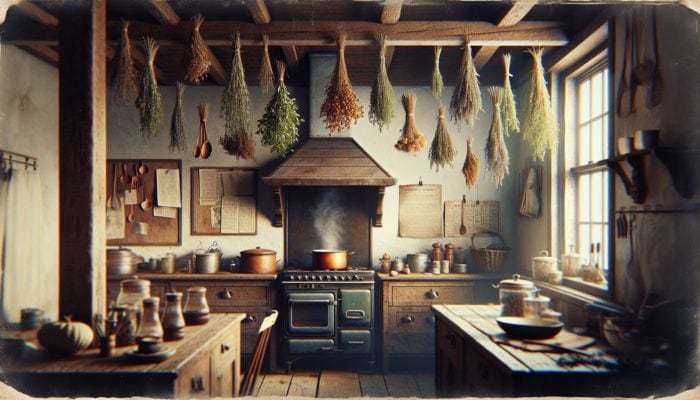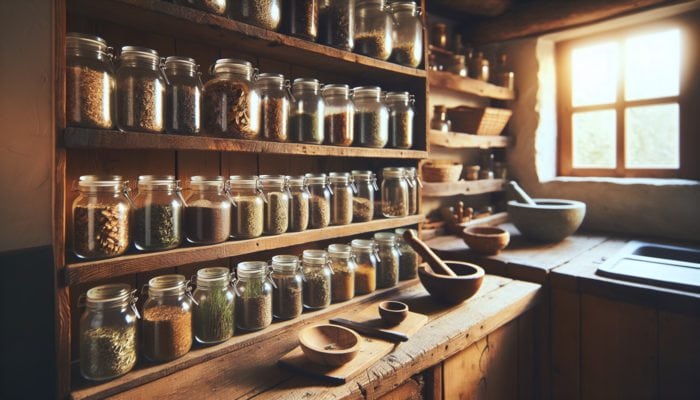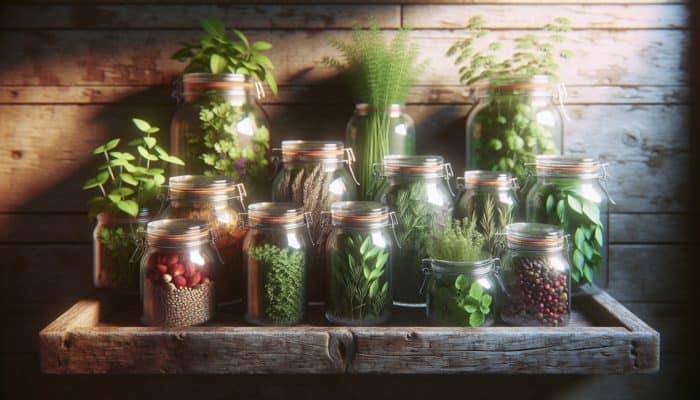Your Comprehensive Guide to Storing Dried Herbs Effectively in the UK
What Do Dried Herbs Entail and Why Are They Essential?

Grasping the concept of dried herbs is vital for anyone passionate about cooking, particularly in the UK, where these flavourful ingredients significantly enhance the taste and aroma of a wide array of culinary dishes. Dried herbs are produced from the leaves, stems, or flowers of various plants that have undergone a meticulous drying process to remove moisture. This critical dehydration not only conserves the herbs but also allows them to retain their unique flavour and scent long after they have been harvested. Within British kitchens, dried herbs are indispensable, elevating everything from traditional stews to innovative sauces, thereby confirming their status as essential components of cooking.
The drying methods for herbs can vary significantly, including techniques such as air drying, using dehydrators, or even microwave drying, with air drying being the most traditional and widely used method. This age-old technique not only diminishes the physical size of the herbs, making them easier to store, but also intensifies their flavours, allowing even a small quantity to have a substantial effect on the overall taste of a dish. The remarkable adaptability of dried herbs enables them to be preserved for extended periods without spoiling, making them an excellent choice for both novice cooks and experienced chefs alike.
Why Is Proper Storage of Dried Herbs Essential for Maintaining Quality?
The importance of correctly storing dried herbs cannot be overstated, as it is fundamental to preserving their flavour, aroma, and overall potency. In the UK's unpredictable climate, marked by fluctuating humidity and temperature levels, inadequate storage practices can quickly lead to a deterioration in the quality of herbs. Exposure to moisture or light can result in the herbs losing their vibrant colours and essential oils, ultimately leading to bland flavours and a significant reduction in culinary value.
By ensuring that dried herbs are stored under optimal conditions, chefs can notably extend their shelf life—sometimes up to three years—while safeguarding the full range of their flavours. This preservation is particularly crucial for home cooks who depend on these herbs to produce authentic British dishes, from hearty casseroles to delicate sauces. Adequate storage not only enhances culinary results but also guarantees that the herbs will exhibit their best qualities whenever called upon in any recipe.
Which Herbs Are Commonly Used in Traditional UK Cuisine?
In the UK, a diverse array of herbs has become integral to the nation's culinary identity. For instance, rosemary is often paired with roast lamb, while thyme is celebrated for adding depth to the flavours of stews and casseroles. Mint is another classic herb that complements lamb beautifully and is frequently featured in refreshing sauces. Other popular herbs include parsley, often utilised as a garnish, and basil, which shines particularly in Italian-inspired dishes that have gained popularity in British cooking.
The culinary applications of these herbs extend well beyond traditional recipes, as modern British chefs cleverly incorporate them into innovative flavour profiles. From timeless meat pies to contemporary vegetarian fare, the significance of dried herbs is irrefutable. Their year-round availability makes them a vital ingredient for any home cook eager to infuse robust flavours into their meals.
Proven Strategies for Effectively Storing Dried Herbs

What Are Real-World Examples of Effective Herb Storage Practices?
Numerous households and professional chefs throughout the UK have mastered the essential art of preserving the quality of dried herbs over time. For example, a renowned chef in London successfully employs glass jars with airtight seals to store her dried herbs in a cool, dark pantry, effectively maintaining their potency for months on end. Similarly, a family residing in the picturesque Kent countryside utilises labelled containers to systematically organise their herb collection, ensuring they always have access to fresh, flavourful herbs.
These practical examples highlight several key methods for effective herb storage:
- Choose airtight containers crafted from glass or metal to prevent moisture ingress.
- Store herbs in a cool, dark environment, away from any heat sources.
- Label jars clearly with the name of the herb and the storage date for easy identification.
- Conduct routine inspections of herbs for freshness and replace them as necessary.
By adopting these effective practices, anyone can emulate their success and fully appreciate the flavour potential of dried herbs.
What Containers Are Best for Storing Dried Herbs?
The most suitable containers for storing dried herbs in the UK are those that are airtight and shield against moisture and light, both of which can significantly compromise the quality of the herbs. Glass jars equipped with tight-sealing lids are a popular choice, as they are non-reactive and do not impart any unwanted flavours. Opaque metal tins can also serve the purpose effectively, provided they are properly sealed to block light exposure.
Here are several recommended container types for storing dried herbs:
- Glass jars with airtight seals
- Opaque metal tins
- BPA-free plastic containers that are airtight
- Vacuum-sealed bags for extended preservation
Selecting the correct container is crucial to ensuring that dried herbs remain aromatic and potent, always ready to enhance any culinary creation.
How Can You Determine If Your Herbs Are Stored Correctly?

Properly stored herbs should display vibrant colours and emit a robust aroma, both of which are clear indicators of freshness. If dried herbs appear dull or lack fragrance, it typically signifies that they have been compromised, likely due to exposure to light, air, or moisture.
To assess whether your herbs are stored properly, consider these indicators:
- Vibrant colours: Fresh herbs should retain their distinctive hues.
- Strong aroma: A potent scent indicates that essential oils remain intact.
- No clumping: Properly stored herbs should be free-flowing and not clumped together.
- Good taste: A taste test can reveal if the herbs still provide flavour.
Being vigilant about these signs guarantees that only the highest quality herbs are utilised in cooking, thus enhancing the overall dining experience.
Optimal Storage Locations for Dried Herbs in UK Homes
Where Should You Store Dried Herbs for Maximum Effectiveness?
Dried herbs thrive in cool, dark places devoid of heat sources, making thoughtful storage locations indispensable for preserving their quality. In most UK homes, the kitchen cupboard serves as an ideal spot for storing dried herbs, provided it is not located directly above the stove or near a window.
Consider these optimal storage locations within UK homes:
- Dark kitchen cupboards, situated away from heat and moisture sources.
- Cool and dry pantry shelves.
- Utility rooms that maintain stable temperatures.
- Basements, as long as they remain dry and free from dampness.
Selecting the appropriate location will help maintain the potency of your herbs, ensuring that they remain effective in cooking for an extended period.
What Temperature Is Ideal for Storing Herbs?
The optimal temperature for storing dried herbs in the UK generally falls within 15-20°C, a condition that is typically achievable in most homes. Storing herbs in environments that exceed this temperature can lead to the degradation of flavours and aromas, particularly during warmer months when kitchens may become uncomfortably heated.
Maintaining this temperature range is imperative for several reasons:
- It prevents the breakdown of essential oils that contribute to flavour.
- It minimises the risk of moisture condensation, which can lead to spoilage.
- It helps preserve the vibrant colours of the herbs.
- It allows for a longer shelf life, making herbs viable for cooking over extended periods.
By closely monitoring the temperature, you can ensure that your dried herbs remain effective and flavourful.
Can Dried Herbs Be Stored in the Refrigerator?
While not typically recommended, dried herbs can indeed be stored in the refrigerator if they are kept in airtight containers. This method may prove beneficial in particularly humid environments where moisture levels could jeopardise the quality of the herbs.
However, caution is advised, as the humidity commonly found in refrigerators can introduce unwanted dampness, potentially leading to clumping or spoilage. If you choose to refrigerate your herbs, ensure to:
- Utilise airtight containers to minimise moisture exposure.
- Avoid frequently opening the containers to maintain moisture control.
- Store herbs separately from strong-smelling foods, as they can absorb odours.
- Regularly check for any signs of degradation.
This approach can help prolong the life of your herbs, particularly in regions of the UK experiencing high humidity levels.
How Long Can Dried Herbs Be Stored in UK Homes?
When stored under optimal conditions, dried herbs can last up to three years in UK households, although their flavour and potency may diminish over time. The three-year mark serves as a general guideline; while herbs may still be safe to use after this period, their flavour might not be as pronounced.
To achieve the best culinary results, it is advisable to utilise dried herbs within one to two years. This timeframe allows for maximum flavour retention and ensures that the herbs are at their peak potency. Regular monitoring and timely replacement of older herbs can assist in maintaining a well-stocked herb cabinet that enhances all your cooking endeavours, guaranteeing that every dish achieves its intended flavour profile.
Understanding the Shelf Life of Dried Herbs in the UK
What Is the Typical Shelf Life of Dried Herbs?
In the UK, the average shelf life of properly stored dried herbs typically ranges from one to three years. While they may not become harmful after this period, their potency is likely to decline, resulting in less flavour in your culinary creations.
To sustain optimal quality, it is advisable to routinely check the freshness of your dried herbs. Look for any signs of fading colour or diminished aroma, as these can indicate a decrease in flavour potency. For the best tasting experience, consider replacing dried herbs at least once a year to ensure that they continue to effectively enhance your culinary creations.
How Can You Extend the Life of Dried Herbs?
To prolong the life of dried herbs in the UK, employing strategic practices that focus on controlling environmental factors is essential. Storing herbs in a cool, dry place and utilising airtight containers are fundamental steps to prevent moisture and light exposure, both of which can drastically shorten their shelf life.
Other effective methods include:
- Regularly inspecting and replacing older herbs to maintain quality.
- Avoiding storage near heat sources, such as ovens or stoves.
- Incorporating desiccants in storage containers to absorb excess moisture.
- Labelling containers with the date of storage for easy tracking.
By adopting these practices, you can effectively prolong the life and quality of your dried herbs, ensuring they remain a valuable asset in your kitchen.
When Is It Time to Replace Dried Herbs?
It is crucial to promptly replace dried herbs when they begin to show signs of losing their colour, aroma, or flavour. In the UK's damp climate, these indicators can appear more rapidly, making regular inspections vital.
Signs that suggest it’s time to replace your dried herbs include:
- Faded colours that indicate a loss of potency.
- A weak or absent aroma suggests that essential oils have dissipated.
- Flavours that lack the depth they once had, leading to bland dishes.
- Clumping or the presence of moisture can lead to spoilage.
By proactively replacing herbs, you can ensure that your culinary dishes remain at their best, filled with rich flavours that delight the palate.
Practical Approaches for Properly Storing Dried Herbs
What Influence Does Storage Have on Herb Quality?
The method of storage has a significant impact on the quality of dried herbs. Factors such as temperature, light exposure, and humidity can alter the physical and sensory characteristics of these herbs. In the UK, where humidity levels can fluctuate significantly, proper storage is crucial for preserving their essential properties.
Consider these key impacts of storage on herb quality:
- Temperature control can prevent essential oils from degrading and maintain flavour.
- Light exposure can cause colour fading and flavour loss, making opaque containers a preferable option.
- Moisture can lead to clumping and spoilage, rendering herbs unusable.
- Airtight storage reduces air exposure, preserving freshness and potency.
Understanding these factors empowers cooks to make informed decisions regarding herb storage, ultimately enhancing their culinary creations.
What Are the Best Practices for Storing Different Types of Herbs?
Different herbs may necessitate specific methods for optimal storage. For instance, delicate herbs such as basil and cilantro may require more careful handling and specific storage conditions compared to sturdier herbs like rosemary or thyme.
When storing various herbs, consider these best practices:
- Store delicate herbs in the refrigerator in airtight containers to maintain moisture levels.
- Robust herbs should be kept in a cool, dark cupboard in airtight jars.
- Always dry herbs thoroughly before storage to prevent moisture accumulation.
- Label containers clearly to track different herbs and their storage times.
By tailoring your storage methods to the specific needs of each herb, you can ensure that all herbs retain their unique flavours and aromas, enhancing the overall cooking experience.
How Can You Store Herbs to Preserve Their Flavour?
To maintain the flavour of dried herbs in the UK, strategic storage is critical. Proper storage not only safeguards the natural properties of the herbs but also prevents them from being tainted by external odours or moisture.
Here are several strategies to protect and preserve the flavour of herbs:
- Keep herbs away from strong-smelling foods, as they can absorb those aromas.
- Store herbs in airtight containers to minimise exposure to air.
- Utilise cool, dark storage areas to prevent light degradation.
- Regularly monitor stored herbs and replace them when signs of degradation are evident.
By implementing these practices, you can ensure that your dried herbs contribute the intended flavours to your dishes, elevating your culinary creations to new heights.
Long-Term Storage Solutions for Dried Herbs
What Are the Most Effective Methods for Long-Term Storage?
For long-term storage of dried herbs in the UK, several methods can significantly extend their shelf life while maintaining quality. Vacuum sealing is among the most effective techniques, as it removes air and moisture, which are two primary culprits in herb degradation.
Consider these best methods for long-term storage:
- Vacuum-sealing herbs in bags to eliminate air exposure.
- Freeze-dry herbs in airtight containers for extended freshness.
- Incorporate desiccants in storage containers to absorb excess moisture.
- Label containers with the date of storage for tracking purposes.
These methods not only prolong shelf life but also ensure that the herbs maintain their vibrant flavours, ready to enhance meals even after prolonged periods.
Can You Freeze-Dry Herbs Without Compromising Their Quality?
Certainly, you can freeze-dry herbs in the UK, and doing so can greatly extend their shelf life while preserving their flavour and aroma. Freezing is particularly advantageous for herbs that may lose potency over time with conventional storage methods.
To freeze-dry herbs effectively, follow these tips:
- Use airtight, freezer-safe containers to prevent freezer burn.
- Label containers with the herb name and date of freezing.
- Portion herbs into smaller containers for easy access without thawing the entire batch.
- Ensure herbs are dry before freezing to avoid clumping.
This method allows you to relish the rich flavours of your favourite herbs even during the off-season, thereby enhancing your culinary repertoire.
How Can You Revitalise Old Dried Herbs?
Reviving old dried herbs in the UK can reinvigorate your cooking, allowing you to salvage herbs that may have lost some potency. Lightly toasting the herbs can help to reawaken their flavours, as heat can reactivate some of the essential oils.
Here are some effective methods to rejuvenate old dried herbs:
- Toast the herbs lightly in a dry pan to release their essential oils.
- Blend the herbs into a finer consistency to increase their surface area for flavour release.
- Add the herbs to dishes earlier in the cooking process to allow their flavours to infuse.
- Combine with fresh herbs to enhance the overall flavour profile of your dishes.
By employing these techniques, you can maximise the potential of dried herbs that might otherwise go unused, enriching your culinary creations.
How Long Can Dried Herbs Be Stored Before They Lose Potency?
In the UK, properly stored dried herbs can last up to three years, but their potency diminishes over time. For the best flavour experience, it is advisable to use dried herbs within one to two years after storage.
Regularly assessing the quality of your herbs is crucial. Factors such as moisture and temperature can accelerate the degradation process. Therefore, while the herbs may still be safe to consume, their effectiveness in cooking can be reduced. Keeping track of storage dates and maintaining a good rotation system can help ensure that your culinary experiences are always at their best.
Avoiding Common Pitfalls When Storing Dried Herbs
What Are the Most Common Storage Mistakes That Should Be Avoided?
Common mistakes in storing dried herbs can lead to a significant decline in quality, adversely affecting the flavours of your culinary creations. One major pitfall is storing herbs near heat sources, such as ovens or stoves, where temperature fluctuations can degrade their potency.
Here are several common mistakes to avoid:
- Storing herbs in non-airtight containers that allow moisture to penetrate.
- Exposing herbs to direct sunlight, which can fade colours and diminish flavours.
- Neglecting to label containers, making it difficult to track freshness.
- Failing to monitor stored herbs for signs of degradation.
By steering clear of these mistakes, you can ensure that your dried herbs maintain their quality and effectively enhance your cooking.
How Does Humidity Impact the Storage of Dried Herbs?
Humidity in the UK can profoundly affect the storage of dried herbs, as excess moisture can lead to clumping and spoilage. When dried herbs absorb moisture from the air, they may lose their potency and compromise their flavours.
To mitigate the effects of humidity, consider these tips:
- Store herbs in a cool, dry place away from moisture sources.
- Utilise airtight containers to minimise air and moisture exposure.
- Monitor the humidity levels in storage areas, especially during the summer months.
- Incorporate desiccants in containers to absorb excess moisture.
By being mindful of humidity, you can ensure that your dried herbs remain fresh and flavourful for a longer duration.
Can Different Herbs Be Stored Together Without Compromising Their Quality?
While it is feasible to store different herbs together, it may not always be the most effective practice. Strong-smelling herbs such as oregano or sage can impart their aroma and flavour to milder herbs, potentially altering their intended taste profile.
Consider these tips when storing herbs:
- Store strong-smelling herbs separately from delicate herbs to avoid flavour contamination.
- Label containers clearly to keep track of different herbs.
- Utilise separate airtight containers for each type of herb.
- Check for flavour compatibility when combining herbs in the same container.
These practices will help maintain the integrity of each herb, allowing it to shine in your culinary adventures.
How Long Can Dried Herbs Be Stored Before They Need Replacement?
Dried herbs can last up to three years when properly stored; however, their flavour and potency often diminish over time. It’s generally advisable to use dried herbs within one to two years for optimal results.
Regular checks for signs of degradation, such as fading colour or reduced aroma, can indicate when herbs need to be replaced. By staying vigilant about storage conditions and monitoring the quality of your herbs, you can guarantee that your culinary endeavours are always enriched with vibrant flavours and aromas.
What Are the Best Containers for Storing Dried Herbs?
The best containers for storing dried herbs include glass jars with airtight seals, which protect against moisture, light, and air, effectively preserving the herbs' quality. These containers are ideal because they do not react with the herbs and can be securely sealed to prevent degradation.
Consider these options for optimal herb storage:
- Glass jars with airtight lids for visibility and protection.
- Opaque metal tins to block harmful light exposure.
- BPA-free plastic containers with airtight seals for versatile storage.
- Vacuum-sealed bags for long-term preservation.
By selecting the right containers, you can maintain the integrity of your dried herbs, ensuring that they remain flavourful and potent for your culinary creations.
Ensuring Top Quality of Herbs in UK Cooking
Why Is It Essential to Maintain Herb Quality in UK Cooking?
The quality of herbs is crucial in UK cooking, as it directly influences the flavour and aroma of dishes. Whether preparing a classic Sunday roast or an innovative contemporary dish, the effectiveness of dried herbs can elevate the overall dining experience. Fresh, potent herbs bring depth, character, and authenticity, empowering cooks to create meals that resonate with both tradition and modern culinary trends.
Utilising high-quality herbs is not merely about taste; it also reflects a cook’s attention to detail and commitment to culinary excellence. The impact of quality herbs can transform meals and enhance appreciation for British cuisine.
How Can You Ensure Consistent Quality of Herbs?
To ensure consistent herb quality in the UK, regularly check and replace outdated herbs while storing them correctly to maintain their potency. This entails adhering to best practices for storage and being mindful of the conditions that can affect herb quality, such as humidity and temperature.
Implementing a rotation system can help manage herb usage effectively, while labelling containers with storage dates provides an easy way to track freshness. By prioritising quality, cooks can guarantee that their dishes maintain the intended flavours, achieving culinary success.
What Advantages Are There to Using Fresh Herbs?
Incorporating fresh herbs into UK cooking can greatly enhance dishes with vibrant flavours and aromas that dried herbs may not replicate. Fresh herbs provide a brightness and depth that can elevate everything from salads to sauces. However, they require different storage methods compared to dried herbs, often necessitating refrigeration to maintain their freshness.
Utilising fresh herbs introduces an additional layer of complexity to dishes, allowing cooks to experiment with flavours and textures. This versatility is essential for any chef looking to create memorable meals that resonate with diners.
What Are the Best Practices for Sourcing Herbs in the UK?
Sourcing herbs from reputable UK suppliers ensures freshness and quality, enriching your culinary repertoire while supporting local agriculture. Farmers' markets often provide excellent access to seasonal herbs, while online suppliers can offer a broader selection, including organic options.
Engaging with local suppliers can also provide valuable insights into the best uses for specific herbs and effective storage methods, ultimately enhancing your overall cooking experience. Prioritising local sourcing not only enriches your dishes but also fosters a connection within the community and promotes sustainable practices.
How Does Herb Quality Impact the UK's Culinary Reputation?
High-quality herbs play a pivotal role in enhancing the UK's culinary reputation by ensuring that dishes are crafted with precision and authenticity. As global interest in British cuisine continues to grow, the emphasis on fresh, high-quality ingredients becomes paramount for chefs striving to make an impact.
The culinary landscape of the UK is evolving, with chefs and home cooks alike emphasising the importance of high-quality ingredients, including dried herbs. By prioritising herb quality, British cuisine can continue to gain recognition on the world stage, showcasing the rich flavours and traditions that define it.
Frequently Asked Questions Regarding the Storage of Dried Herbs
How should I store dried herbs for optimal freshness?
Dried herbs should be stored in airtight containers in a cool, dark place away from heat sources. This approach helps maintain their flavour and potency.
Can I use plastic containers for storing dried herbs?
Yes, but ensure that they are BPA-free and airtight to protect the herbs from moisture and air exposure.
How can I tell if my dried herbs have gone bad?
Check for faded colours, weak aromas, or clumping. These are signs that the herbs may have lost their potency and should be replaced.
Is it safe to consume old dried herbs?
While old dried herbs are generally safe to consume, their flavour and aroma may diminish over time. It's advisable to replace them regularly for the best culinary results.
How can I enhance the flavour of old dried herbs?
You can lightly toast the herbs in a dry pan or blend them into a finer consistency to help revive their flavours.
What is the best way to label herb containers for easy identification?
Label containers with the herb name and date of storage to help you track freshness and usage over time.
How long do dried herbs last when stored properly?
Properly stored dried herbs can last up to three years, but are best used within one to two years for optimal flavour retention.
Can I freeze-dry herbs without losing quality?
Yes, freezing dried herbs in airtight containers can significantly extend their shelf life while preserving their flavour and aroma.
What types of herbs are commonly used in UK cooking?
Common herbs in UK cuisine include rosemary, thyme, mint, parsley, and basil, all of which enhance various traditional and modern dishes.
Should I store herbs in the fridge for better preservation?
It's not usually recommended, but herbs can be stored in the fridge in airtight containers if humidity is a concern.
Connect with us on Facebook!
The Article: How to Store Dried Herbs Properly: UK Guide appeared first on https://mcrtherapies.co.uk
The Article Storing Dried Herbs Properly: A Guide for the UK Was Found On https://limitsofstrategy.com

